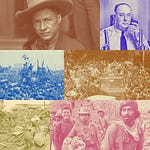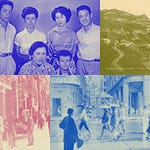It is easy to distance yourself from people you don’t understand and dehumanize them as “the other.” Self-examination requires us to step into the deepest abyss of human history. The worst thing we think we can find there is a mirror, and that is a scary prospect. But this self-examination can lead you to a wonderful place and make you a much kinder person.
When concentrating on the mass murder-suicide at Jonestown, the biggest question is, “How did Jim Jones get more than 900 people to drink the Kool-Aid?” To understand that, we must understand American history.
America has not been kind to most people here. When it began, People’s Temple was rather unique for its time. Even the pews of mainline churches were segregated, and the ministers in the pulpit proclaimed that was what God wanted. In that climate in Indiana, Jim Jones’ was a pastor to an inter-racial church. He was also one of the first to adopt inter-racial children in Indiana. In this interesting biography
It was she (Marcy Jones) in fact, who pushed for the couple to adopt four children of color in addition to the eleven-year-old white girl who was their first adoptee. The household also included one biological child, Stephan. If defenders of Jones, or those who call for fair play at any rate, wish to cite bona fides, they would find none stronger than those three Korean-American kids (Stephanie, Suzanne, and Lew), the Indiana orphan named Agnes and the boy the Joneses claimed as the first African American to be adopted by a white family in Indiana, James Warren Jones Jr. The family paid a steep price in social antagonism for their magnanimity.
Later, when the church moved to Ukiah California, According to one witness who had friends in the temple, he said:
Jim Jones brought some of the very first blacks to the county. My family gave Jones and the people with him a lot of credit for effectively integrating a fairly homogenous – that is, all white – part of California. But it was a very redneck place, and there were no shortages of nasty stories and comments about “Jim Jones and his n******.” For my family, this type of thinking – born in vicious racism and ignorance – was abhorrent. We saw and applauded the good side of the Temple: Jim Jones was giving inner city kids a second chance in a new environment, and that environment received the opportunity to experience and learn about racial diversity. And the kids themselves were fantastic – kind, nice, studious – maybe a bit on the quiet and private side, but good kids who were making the best of their opportunity.
The majority of the people who went to Jonestown were black citizens who had survived the worst of America. They were the ones who bravely fought against the Nazis, only to realize that back home, they were considered second or third-class citizens. They had felt the everyday slights from white American society, the terror of the Klan, and even medical experimentation on some of them. Living through that, would it be hard for the people of Jonestown to believe that America planned on putting its black citizens in concentration camps?
This interview taught me that often we make disparage the marginalized because of the faith we have in our institutions. Many of us believe that our institutions will never turn on ourselves, and there will be a time where there is no place to go to feel safe. If we put such blind faith into American institutions, are we that different?
Fielding McGehee, whose lost family on that fateful day in Guyana, talks to us. He and his wife Rebecca have spent the last 40 years chronicling and documenting the people’s voices of Jonestown. It is an archive rich with primary sources, unique perspectives that focuses on a community rather than one leader. He answers this question and many more. More richly, he focuses on the people, the community they created, and the legacy they left behind.
This is a unique-eye opening interview.
Music by Wreck Tech, who can be found on SoundCloud and Spotify.












A People's History of Jonestown with Fielding McGehee